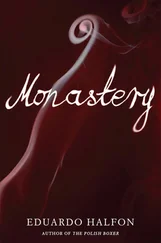Eduardo Halfon - The Polish Boxer
Здесь есть возможность читать онлайн «Eduardo Halfon - The Polish Boxer» весь текст электронной книги совершенно бесплатно (целиком полную версию без сокращений). В некоторых случаях можно слушать аудио, скачать через торрент в формате fb2 и присутствует краткое содержание. Год выпуска: 2012, Издательство: Bellevue Literary Press, Жанр: Современная проза, на английском языке. Описание произведения, (предисловие) а так же отзывы посетителей доступны на портале библиотеки ЛибКат.
- Название:The Polish Boxer
- Автор:
- Издательство:Bellevue Literary Press
- Жанр:
- Год:2012
- ISBN:нет данных
- Рейтинг книги:4 / 5. Голосов: 1
-
Избранное:Добавить в избранное
- Отзывы:
-
Ваша оценка:
- 80
- 1
- 2
- 3
- 4
- 5
The Polish Boxer: краткое содержание, описание и аннотация
Предлагаем к чтению аннотацию, описание, краткое содержание или предисловие (зависит от того, что написал сам автор книги «The Polish Boxer»). Если вы не нашли необходимую информацию о книге — напишите в комментариях, мы постараемся отыскать её.
marks the debut of a major new Latin American voice in English.
The Polish Boxer — читать онлайн бесплатно полную книгу (весь текст) целиком
Ниже представлен текст книги, разбитый по страницам. Система сохранения места последней прочитанной страницы, позволяет с удобством читать онлайн бесплатно книгу «The Polish Boxer», без необходимости каждый раз заново искать на чём Вы остановились. Поставьте закладку, и сможете в любой момент перейти на страницу, на которой закончили чтение.
Интервал:
Закладка:
There was another stool there, but Milan remained standing between the two of us. I guessed he must have been about my age. He was wearing a light, loose-fitting tortilla-colored shirt and his fingers were heaped with heavy silver rings. His dark, straight hair almost covered his face entirely, and for some reason I started thinking about bridal veils, which Lía really had a thing about. Maybe because of the shape of his eyes, maybe because of something else much harder to pin down, he seemed to me to have a nocturnal look about him. The look of someone who can see properly only at night, or who wants to see properly only at night. The look of a vampire, but a sad, well-meaning vampire who doesn’t need any more blood, just a long splash in holy water.
We ordered three tequilas. So you’re from Belgrade? Lía asked him. Yes, Belgrade, though I’ve lived abroad for many years, he said, keeping his gaze fixed on the dark-skinned girl as she served the three drinks. Thanks so much, Miriam, he said flirtatiously. And where have you lived? I asked. What a beauty, he whispered, and then, as if exiting a dark, narrow tunnel, he said he’d studied music in Italy, in Russia, and currently in New York. A little confused, I sat looking at the dark-skinned girl with the Mayan features until Lía gave my leg a good hard pinch. And what will you play tomorrow, Milan? she asked. Who knows, it’s always a mystery, he said mysteriously, with a hint of showy dogmatism. Then he said: Maybe a little Rachmaninoff, or Saint-Saëns, or Liszt, or Stravinsky. Ah, Charlie Parker’s favorite, I said just to say something. Milan smiled. You like jazz? I told him that in my last or second-to-last incarnation, before making the small leap over into a Judeo-Latin American cosmology, I must have been a third-rate black jazz musician playing in some brothel in Kansas City or Storyville (a name so lovely, it seems made up), although I could just as easily have been a black hooker from Kansas City or Storyville who spent all night fucking to the rhythm played by some third-rate jazz musician. Which is to say, I said with all the seriousness of a poor forgotten harlequin, I’ve got jazz deep in my gonads. And I downed the tequila. What kind of jazz do you like? Milan asked, and before I could reply, I felt Lía’s warm hand over my mouth. This one I know by heart, she said. He likes pure jazz, she said. He likes anyone who plays with swing, right? Although Dudú has never managed to explain to me what swing is. I licked her fingers. Laughing, she wiped her hand on my thigh. You can’t explain swing, Milan murmured. I like Bird and early Miles and Coltrane and Tatum and Powell and Mingus, I told him. But my true love is Monk. Ah! cried Milan after a little sip of his tequila, the magnificent Thelonious Monk. And then, as if we were invoking the names of Aztec warriors or of strange Nordic runes, we took turns reciting the titles of everything written by Melodious Thunk, as his wife called him, every single piece, in a jumble that somehow appeared organized by the stiff fingers of that eccentric pianist of dissonances and berets and mystic trances and the cheeks of a happy minnow. Lía listened patiently to us, dropping in questions here and there. You can easily recognize a Monk composition by its style, I replied, but it’s not easy, even for true devotees, to know exactly which piece it is. He didn’t go near the piano in his later years, Milan replied. I think epistrophy is a botanical term, I replied, and Milan immediately gave me a mocking smile. It doesn’t mean anything, he said. That son of a bitch made it up. But isn’t epistrophe also a rhetorical term, something repetitive, very musical, asked Lía, as in the famous: They’re born to thieves, raised among thieves, they study to be thieves, and finally become thieves themselves? And though she was right — Milan responded to the Cervantes quotation with a sour expression that wouldn’t make sense to me till the following day — neither of us answered her. I pointed out that, in an interview with George Simon in Metronome , Monk had said it was a botanical term, signifying the reversion of abnormal to normal. And you believe him, Eduardito? Utter nonsense, he said. I looked it up myself. There are people who say, in the same way, that Monk took the concept from Greek mythology, from epistrophe as associated with Aphrodite and love and sexuality and other such crap, but that’s all nonsense too. Milan paused, and it struck me that he even spoke musically. He said: Some things signify nothing and are beautiful all the same. Epistrophy, he said, and the word fell like a dead dragonfly in a bowl of warm lentil soup. Then, in a fatherly gesture that could well have had more of a spiritual meaning among old Yugoslavs, or could equally have meant nothing at all, Milan, who still hadn’t sat down, stroked my head fondly.
No one said anything for a few moments, a fitting silence, full of the most intense dignity. Lía stubbed out her cigarette, said excuse me, and went to the bathroom. Milan walked over to the bar and asked the dark-skinned girl for a glass of red wine. And stayed there, flirting with her. A theater director came over to say hello, but I acted uninterested and he soon went off again. Anything for you? said Milan, and I was struck once again by the very Argentinian way he spoke Spanish. A beer, please. He asked me about Lía and I told him her full name was Lía Gandini, that we’d met during the intermission of a performance of some comic monologues after putting up with one very bad-tempered Italian actor and another quite charming one, and that we’d been introduced by a mutual friend, whom we went on to ignore as we drank red wine for the rest of the intermission, too dry (the wine) and too short (the intermission), and I rambled on about one of Dario Fo’s tigers that I liked and she smiled at me with those endless eyelashes of hers. Milan didn’t appear to pick up on the reference. I like her long neck, he said. Like a swan, he said. Like one of Modigliani’s women. I guess, I said, and took a sip of beer. I asked him if there had been any difference between studying classical music in the States and in Europe. God, he said, huge. And he sat down on Lía’s stool. The thing is, he said, the Americans like classical compositions to be played as if one were a machine or a robot. Devoid of all emotion. As if you weren’t there. The music always exactly the same. What they want, he said, is to eliminate the interpreter’s personality altogether. He lit a cigarette and, smiling at the dark-skinned girl, thought for a moment. Do you know who Lazar Berman was? No idea. A great pianist, he told me. A Liszt expert. A Russian Jew who fought against the music of Chopin the Pole, he said, and immediately jumbling up his words, I had thoughts of the Polish boxer fighting every night, followed by thoughts of my grandfather fighting with Polish words. I studied under Berman as a child, Milan said, in Italy. Want one? he asked, and I accepted a cigarette. I remember that on the first day, in his studio, I played Liszt’s Sonata in B Minor, a very complex piece, and the old Jew, sitting on his enormous red velvet sofa, didn’t say a word. Nothing. The second day, I went back to his studio, began playing the same piece and, straight off, Berman got up and began tapping the window with his cane, like this, very softly. Milan, after a long sip of wine, dried his mouth on the sleeve of his shirt. The old man shouted at me in Russian: You’re playing the piece the same way you did yesterday, child. I kept my mouth shut as Berman carried on tapping the window with his cane. I thought he’d lost it. But then he walked over to me, very slowly, put a hand on my shoulder and, with a devilish smile, whispered: Haven’t you noticed, my boy, that it’s raining today? A big difference, Milan said, moving aside so that Lía could sit down. Tomorrow, Eduardito, I’ll play a little Liszt, he concluded, as if this confirmed the truth of his anecdote, and off he went to chat with the dark-skinned girl.
Читать дальшеИнтервал:
Закладка:
Похожие книги на «The Polish Boxer»
Представляем Вашему вниманию похожие книги на «The Polish Boxer» списком для выбора. Мы отобрали схожую по названию и смыслу литературу в надежде предоставить читателям больше вариантов отыскать новые, интересные, ещё непрочитанные произведения.
Обсуждение, отзывы о книге «The Polish Boxer» и просто собственные мнения читателей. Оставьте ваши комментарии, напишите, что Вы думаете о произведении, его смысле или главных героях. Укажите что конкретно понравилось, а что нет, и почему Вы так считаете.












